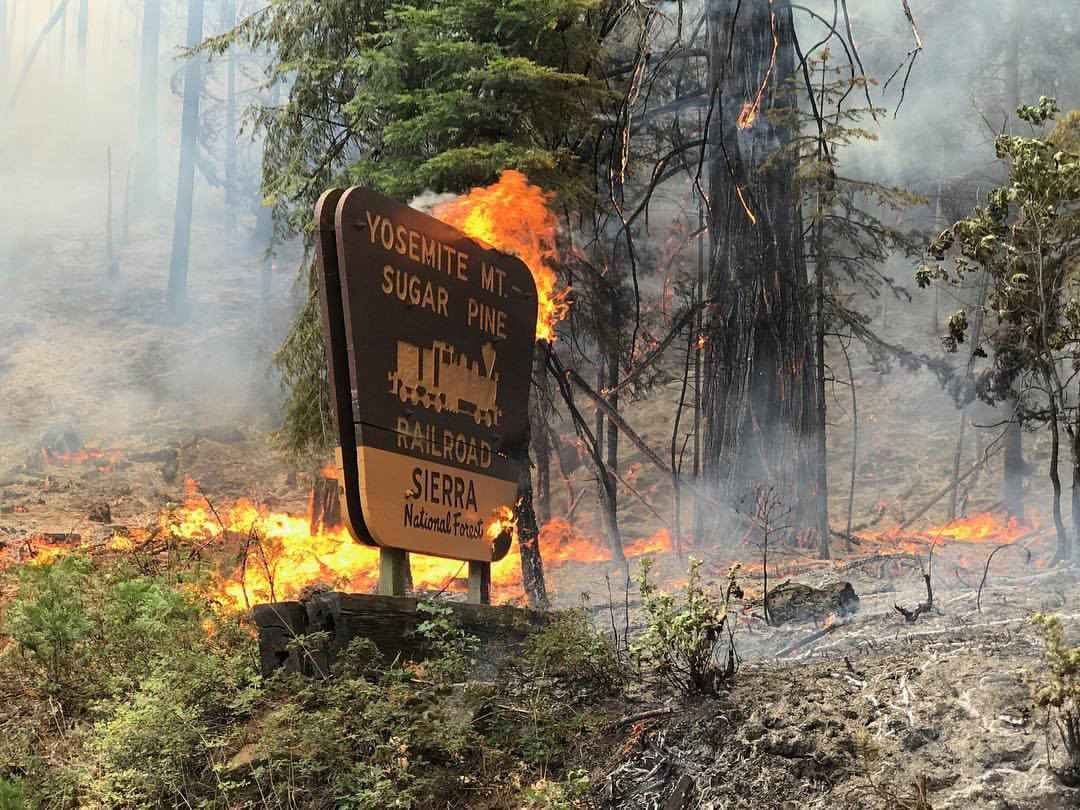
2017 Railroad Fire in Madera and Mariposa Counties
Credit: Madera County Sheriff's Office
September 22, 2018 - SACRAMENTO, Calif. - Insurance Commissioner Dave Jones announced Friday that five additional bills he sponsored to protect California wildfire survivors have been signed by Governor Jerry Brown. SB 894 (Dodd), AB 1772 (Aguiar-Curry), AB 1800 (Levine), AB 1875 (Wood), and AB 2594 (Friedman) aim to address critical issues facing wildfire survivors including underinsurance, rebuilding, and recovery. Two of the bills take effect immediately.
"Fire survivors deserve maximum flexibility in their recovery efforts," said Insurance Commissioner Dave Jones. "These bills will help consumers try to get back on their feet after devastating wildfires. I'd like to thank Governor Brown for signing these bills and Senator Dodd and Assemblymembers Aguiar-Curry, Levine, Wood, and Friedman for all their efforts to help wildfire survivors."
SB 894 (Dodd) will help homeowners reduce the huge financial burden of being significantly underinsured and unable to afford to rebuild. Underinsurance is not only a financial blow to disaster survivors, it is economically devastating to communities because, as one of the most challenging obstacles to loss recovery, it delays claim settlements which delays rebuilding. Insurers have generally failed to address this significant issue through any efforts of their own. Some consumers have found themselves uninsured by hundreds and thousands of dollars.
The bill still provides survivors the option to move the amount of their additional structures (Coverage B) losses to their primary dwelling (Coverage A) within their homeowner policy to help offset some of the underinsured amount in their home, but only in a limited fashion after significant narrowing at the hands of much of the insurance industry. Consumers only qualify for this provision if they meet three tests: 1) It is following a declared disaster; 2) They suffer a total loss; 3) They are underinsured in their primary dwelling or Coverage A.
"Despite heavy insurance industry lobbying against it, this new law makes important improvements that will help people rebuild their homes and help communities recover," said Senator Bill Dodd. "I fought for even greater protections and I will continue to urge reforms to stop insurance companies from denying policyholders the coverage they've paid for and deserve."
SB 894 allows consumers facing a total loss to generally have three years to utilize their Additional Living Expenses (ALE) coverage, up from the current two. SB 894 also provides homeowners suffering a total loss from a fire two renewal offers, instead of the current one. This provision reflects the reality that it takes most survivors more time than currently permitted to rebuild or replace their property. This provision of the bill would have applied retroactively to July 1, 2017 to help 2017 fire survivors; however, many insurance companies insisted SB 894 not help 2017 or 2018 wildfire survivors and successfully pushed to remove the retroactivity from this bill at the Assembly Insurance Committee.
After losing a home or business in a fire resulting in a declared state of emergency, current law provides a policyholder at least two years to rebuild their property and receive the full replacement cost coverage they paid for. However, experience shows that two years is often insufficient time for families to rebuild the insured property. AB 1772 (Aguiar-Curry) extends the amount of time a home or business owner has to rebuild an insured property from two to three years after a declared wildfire emergency and receive the full replacement costs to which they are entitled. AB 1772 takes effect immediately.
The 2017 fires also revealed that some insurers were withholding the additional Extended Replacement Cost coverage purchased by policyholders unless the policyholder actually rebuilt on the same lot. This is against the law. In the event of a total loss, AB 1800 (Levine) would clarify the current law that an insurer must pay out the full extended replacement cost benefit covered under the provisions of a plan, regardless whether the policyholder chooses to rebuild at the same location, rebuild at a new location, or purchase an already built home. AB 1800 takes effect immediately.
AB 1875 (Wood) addresses confusion surrounding extended replacement cost coverage (ERC), which allows property owners to purchase limits above the estimated cost to replace the home. However, ERC limits can vary dramatically and many consumers are never provided these options by insurers nor are they told how the coverage options, would impact their premiums. AB 1875 would require an insurer who does not provide at least 50 percent ERC to help direct the consumer to an insurer that might. The bill also includes a provision creating a home insurance finder to help consumers locate possible residential property insurance options.
AB 2594 (Friedman)extends a consumer's right to sue their insurer following a declared disaster from 12 months to 24 months, given that it now takes longer to rebuild after California's significant fires the past few years. After losing a home or business in a fire resulting in a declared state of emergency, current law provides a policyholder at least two years to rebuild their property and receive the full replacement cost coverage they paid for. However, experience shows that two years is often insufficient time for families to rebuild the insured property. Some insurers have refused consumer claims, citing the lack of a lawsuit within the 12-month timeframe.
Source: CPRB









